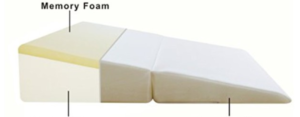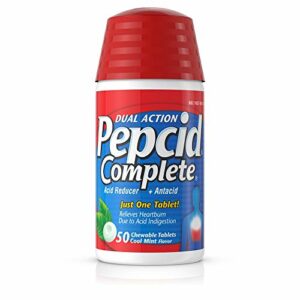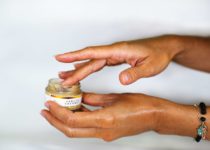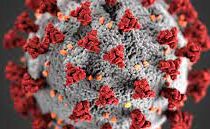7 Best Ways to Treat Your GERD
SUMMARY POINTS
- First line treatments are: weight loss, avoiding fatty foods 2-3 hours before bedtime, elevating your bed, and avoiding certain triggers (alcohol, smoking, chocolate, caffeinated drinks like coffee, peppermint, citrus fruits and juices)
- If you get acid reflux once a week, we recommend an antacid such as Tums
- If you get acid reflux two or more times a week, we recommend a Proton Pump Inhibitor (PPI) such as lansoprazole (Prevacid). You can also try an H2 blocker like famotidine (Pepcid), especially at night if you have nighttime acid reflux.
- PPIs should be given 30-60 minutes before meals for maximum relief.
- Please consult your doctor if you have acid reflux for more than 14 days while taking anti-GERD medications.
- Please consult your doctor if your child has acid reflux or you are pregnant/breastfeeding.
What is GERD (Gastro-Esophageal Reflux Disease)?
GERD, commonly known as acid reflux, is a condition where acid in your stomach goes up into your esophagus, which is the tube that connects your throat to your stomach. This condition happens to people all over the world including people in Southeast Europe, South Asia, and the United States. In 2018, this disorder led to 9 million doctors visits in the U.S. The most common symptoms are heartburn and regurgitation of acid and food into your throat. These symptoms are usually worse after a meal or at night when you are lying down in bed. If left untreated, GERD can further erode the lining of your esophagus and lead to severe complications.
Check out this video for a nice for a visual overview of GERD.
There are many factors that cause GERD. The most common causes include tobacco smoking, obesity, and certain dietary foods such as alcohol, caffeinated beverages, chocolate, fatty foods. Certain medications like aspirin and Nonsteroidal anti-inflammatory drugs (or NSAIDs) like ibuprofen (Advil, Motrin) and naproxen (Aleve) can also cause GERD. In the next sections, we shall be discuss both non-drug and drug therapies that can help reduce and prevent your symptoms.
Non-Drug Therapy 1: Weight Loss
Lifestyle modifications such as weight loss and avoidance of triggers are always the best solutions to improve GERD symptoms, and can be combined with drug therapies if needed. If you are overweight, your excess weight may be contributing to your GERD symptoms. By increase fiber in your diet and losing weight, you may start noticing fewer GERD episodes and feel a sense of general overall well-being. So losing weight and eating lots of fiber is good to prevent heart disease, but it helps to prevent acid reflux as well!
Non-Drug Therapy 2: Elevate your Bed
Many people get acid reflux at night when they are lying down in bed because it is easier for the acid in your stomach to move into your throat when you are lying down. The solution then is the elevate the head of your bed by putting a foam wedge or block at the head of the bed so that gravity can keep your gastric acids from regurgitating into your esophagus and throat (see image below).
Another thing to consider at night is what you eat and how late you eat at night. Avoid meals 2-3 hours before bedtime (6 hours before bedtime is even better), especially fatty meals. The closer you eat toward bedtime, the higher the chance you may experience acid reflux symptoms.
Non-Drug Therapy 3: Which Foods Aggravate GERD?
We already mentioned how fatty foods late at night can aggravate your GERD symptoms. Other culprits that can trigger acid reflux symptoms include chocolate, caffeinated drinks like coffee, peppermint, and citrus fruits and juices. So does this mean you should stop consuming your favorite latte? Nope. In fact, the American College of Gastroenterology in 2013 does not recommend elimination of the above foods to prevent GERD. However, the American College of Gastroenterology did say that if avoiding certain foods helps to relieve your GERD symptoms, then you should avoid those foods. Common sense comes into play here as there is no hard and fast rule because each person responds to certain foods differently. In my profession opinion, if you have bad GERD symptoms on a certain food, you may want to limit or avoid that food. Moderation and common sense is key here.
Non-Drug Therapy 4: What about Smoking and Alcohol?
Cigarette smoking and alcohol consumption can also trigger acid reflux symptoms. The American College of Gastroenterology in 2013, however, does not recommend stopping cigarette smoking and drinking alcohol to prevent GERD. However, the American College of Gastroenterology did say that if avoiding smoking and alcohol helps to relieve your GERD symptoms, then you should avoid them. This recommendation to stop cigarette smoking and drinking alcohol is similar to the recommendation to avoid certain foods that trigger your GERD symptoms. In my professional opinion, moderation is key. Do not over-consume alcohol, especially if it causes you to feel heartburn afterwards. I am also not a fan of cigarette smoking as it can cause damage to your lungs, which is more concerning than acid reflux symptoms.
This video is a nice summary of many of the non-drug tips we have already discussed to stop acid reflux.
Next, let’s move on to discuss drug therapies that can be used to treat GERD symptoms.
Drug Therapy 1: Antacids
Antacids are first up and commonly have ingredients such as aluminum hydroxide, calcium carbonate, and magnesium hydroxide. Antacids work very quickly within 30-60 minutes to neutralize heartburn symptoms so they are very convenient to use as needed. Antacids also are available over-the-counter in many different forms such as tablets and suspensions. They are not that effective for severe GERD, however, but are more useful if you get milder symptoms no more than once weekly. If you get symptoms more frequently than once weekly, you may need a stronger medicine like a Proton Pump Inhibitor (PPI) which we will discuss in an upcoming section. But before we discuss stronger options, I want to highlight the side effects antacids can have. Magnesium-containing antacids like Mylanta may cause diarrhea if you take too much of this drug. Calcium-containing antacids like Tums, on the other hand, may cause constipation if you take too much of this drug. All of these antacids should be used cautiously if you have kidney problems because calcium, aluminum, or magnesium can possibly accumulate if you have kidney issues. If you are pregnant, avoid antacids like that contain bicarbonate such as Alka-Seltzer. Lastly, antacids have numerous drug interactions. For example, if you plan to use an antacid like Tums while you are on an antibiotic like Cipro, then make sure to take them at separate times. Take the Cipro two hours before or six hours after taking your Tums. Your pharmacist can tell you if your current medications will interact with antacids.
Drug Therapy 2: H2 Blockers (Histamine-2 Receptor Antagonists)
The next class of drugs which can prevent and treat heartburn and GERD symptoms are called H2 Blockers (Histamine-2 Receptor Antagonists). H2 blockers are NOT to be confused with antihistamines like Benadryl that you use for allergies. H2 blockers are available over-the-counter or as a prescription and include cimetidine (Tagamet), famotidine (Pepcid), and nizatidine (Axid). We will not discuss rantidine (Zantac) since it was recalled in 2020 (Click here for the details). H2 blockers also work pretty quickly within 1 to 3 hours to neutralize heartburn and acid reflux symptoms. H2 blockers are a good choice if you get mild acid reflux and heartburn symptoms two or more times every week. All H2 blockers have similar efficacy but we recommend famotidine (Pepcid). We are not big fans of cimetidine (Tagamet), however, because it has a lot of drug interactions. H2 blockers are a great choice if you get nighttime GERD or heartburn symptoms. You can use an H2 blocker alone to treat nighttime symptoms or you can combine it with another drug called an PPI, which we shall be discussing in the next section.
H2 blockers are generally well tolerated by most people and have the typical side effects that are common with all medications (headaches, drowsiness, constipation, etc.). H2 blockers should be used for no longer than 14 days. If you still have acid reflux symptoms after 14 days of using an antihistamine antacid, then we recommend you consult your doctor.
Drug Therapy 3: PPIs (Proton Pump Inhibitors)
Perhaps the most revolutionary heartburn relief medicines and acid reducers for GERD are the PPIs (Proton Pump Inhibitors). These drugs are also available over-the-counter and by prescription and include dexlansoprazole (Dexilant), esomeprazole (Nexium), lansoprazole (Prevacid), omeprazole (Prilosec), pantoprazole (Protonix), rabeprazole (Aciphex), and omeprazole-sodium bicarbonate (Zegerid). The important thing to remember is that s PPI must be taken about 30 to 60 minutes before a meal because they work by neutralizing the acid in your stomach that is formed when you eat. Dexlansoprazole (Dexilant) is the only PPI you can take without regard to meals. All PPIs have similar efficacy and they resolve GERD and heartburn symptoms better than H2 blockers and antacids. If you have GERD symptoms two or more times per week, we recommend a PPI over an H2 blocker or an antacid. You should try out the PPI for 14 days. If you still have GERD symptoms after 14 days, please consult your doctor. Your doctor may tell you to take your PPI medication for up to 2 months, increase your dose, or may switch you to another PPI medication.
We do not recommend you use these PPI medications for longer than 2 months without your doctor’s permission. Using PPIs continuously for many months or years is linked to rare but serious side effects. If you use PPIs for many months or years, you have an increased chance for a bacterial diarrhea called C. Difficile. Longterm PPI therapy is also linked to osteoporosis (brittle bones), pneumonia (infection of the lungs), and kidney disease. If you have been taking a PPI for 2 months or longer and desire to stop, you should decrease the dose slowly to prevent your GERD from relapsing. We recommend you begin taking half the dose you normally take for 1 week. For the 2nd week, take the PPI every other day. On the 3rd week, you can take your PPI every 3rd day, and then you can stop taking the PPI at the end of the 3rd week. If your acid reflux flares up again, it is okay to take your PPI again for a few days until your symptoms resolve.
FAQ 1: Can I combine different types of antacids?
Yes you can. Pepcid Complete, for example, contains both an H2 blocker (famotidine) and antacid (Calcium Carbonate and Magnesium Hydroxide). Additionally, if you have nighttime GERD symptoms, you can use an H2 blocker like famotidine (Pepcid) at night even if you are taking a PPI (Proton Pump Inhibitor) during the day.
FAQ 2: What time of day is the best time to take antacid medications?
Antacids like Tums can be taken as needed whenever you have heartburn symptoms. H2 Blockers like Pepcid (famotidine) can be taken during the day or at night if you have nighttime GERD symptoms. PPIs (proton pump inhibitors) are best taken 30 to 60 minutes before a meal.
FAQ 3: Which Proton Pump Inhibitor (PPI) is the best if I am a fast metabolizer?
If you had a genetic test done that shows you are a fast metabolizer of PPIs, then we recommend you use rabeprazole (Aciphex). Rabeprazole (Aciphex) is not metabolized in the same way as the other PPIs so the drug will work normally whether you are fast metabolizer or not.
FAQ 4: Which anti-GERD drugs are safe in pregnancy?
We first recommend lifestyle changes such as avoiding fatty foods 2-3 hours before bedtime and avoiding certain triggers (chocolate, caffeinated drinks like coffee, peppermint, citrus fruits and juices). It is best to avoid medication therapies to prevent risk to the fetus, especially during the First Trimester.
If lifestyle changes do not work, you can try taking a calcium-containing antacid like Tums as needed. You can also use Tums if you are breastfeeding. Just make sure it only contains Calcium Carbonate, and not other active ingredients. Do NOT take antacids that contain bicarbonate such as Alka-Seltzer or magnesium trisilicate (Gaviscon).
FAQ 5: When should I contact my doctor for GERD symptoms?
You should contact your doctor if you have acid reflux along with one of the following:
- You are pregnant or nursing
- You are a child or adolescent
- You have chest pain
- You have pain in your throat when swallowing
- Your symptoms persist for more than 14 days after using antacids, H2 blockers, or PPIs (Proton Pump inhibitors)
- You have unexplained weight loss
- You have dark stools, which could indicate an ulcer or bleeding in your digestive tract (stomach, intestines)





